by WorldTribune Staff, June 9, 2017
The California Senate last week passed a bill that would grant every resident, whether legal or not, eligibility for health care coverage with no premium, no co-payment and no deductible, a report said.
While the Republican effort in D.C. to replace the broken Obamacare system has bogged down, California lawmakers and those in New York, New Jersey, Rhode Island and Massachusetts have this year proposed Europe-style single-payer health care plans, Fox News.com reported on June 7.

While many residents may long for a single-payer system, the question of whether or not the states will be able to pay for it is another story.
The estimated price tag for California’s plan is $400 billion, more than the $290 billion state budget and considerably more than the $367 billion in state, federal and private money currently used to pay for health care in the state, the report said.
“A number of states have tried to set up single payer – and they all abandon the effort because the taxes are too high and California is going to find out the same thing,” said health care industry analyst Avik Roy.
Single-payer supporter Jamie Court of Consumer Watchdog said that “if you look at the financing of a single-payer system, what you’ll find is it saves money if it’s done right. That’s why every other country in the world pays two-thirds less. It gets rid of the insurance companies.”
Doing it right is the hard part.
In a single-payer system, insurance companies such as Kaiser, Aetna, Blue Cross and UnitedHealth Group would be out of business, the Fox report said. The states would contract directly with providers for services.
Critics say to control costs the state governments would deny care, “meaning consumers will not get all the drugs or care they need or want, and doctors and hospitals will have no choice but to accept whatever reimbursement rate the government mandates,” the report said.
Additionally, the salaries of medical workers would inevitably go down, as has been the case in other countries which have embraced nationalized medicine.
“So the quality and competition goes away in single-payer in a way the private system has in a robust way,” says Roy.
According to a January poll by Pew Research, 40 percent of Democratic voters favor a single-payer system. And a majority, about 60 percent of Americans, said the government has a responsibility to ensure every resident has health care.
In California, the single-payer legislation must still pass the Assembly and needs a signature from Gov. Jerry Brown, who reportedly supports the concept, but is skeptical since the bill is silent on how it’s paid for, the Fox report said.
Pete Peterson, dean of the Pepperdine School of Public Policy in Malibu, said for the plan to get even this far illustrates how far left the state Democratic Party has swung.
“I think this recent vote in the Legislature around single payer is bowing towards the Bernie Sanders wing of the party,” says Peterson. “The challenge for someone like Gov. Brown is how he holds his party together, one that is really being pulled in two different directions – one being the moderate, Clinton or Obama wing vs. the Bernie wing, which is increasing in power.”
Letters to the Editor __ Subscribe to Geostrategy-Direct __ Support Free Press Foundation
